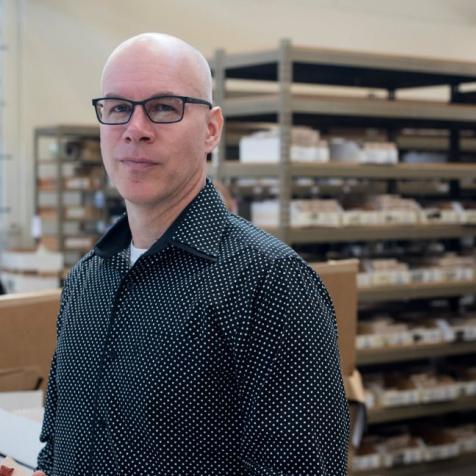
Company Details
Location
Richmond, California
Founded
1974
Ownership Type
Private
Employees
50
Products
Stamps, Dies & Art Supplies
Richmond, CA
Founded: 1974
Employees: 50
Privately Owned
Industry: Consumer and Lifestyle
Products: Stamps, Dies & Art Supplies
Owner and CEO Aaron Leventhal keeps his family business at the top of its field by adapting to a drastically changing marketplace in the art & crafts industry.
Leventhal’s mother started Hero Arts in 1974. As a teacher, she found that by sharing her own background in photography and art, she was able to reach out and interest difficult to teach students. While searching the basement of her school for art projects for her students, she found an old vulcanizing machine. She used the machine to press rubber stamps of her designs for her class, and found immediate interest from not only her students, but from friends and colleagues. The side project of stamp making led to local, regional, then national craft shows, and Hero Arts was well on its way to a becoming a serious business. Today, Hero Arts designs and supplies premium quality stamps, as well as inks, paper and metal frame cut dies used in card making, scrapbooking, and paper crafting.

At its largest, around 2002, Hero Arts employed 150 people and sold its products through 6,000 retail outlets around the country. Most of those retailers were small, independent businesses which have now dwindled to about 600 in number, as times have changed the way people shop. Leventhal managed to shift the retailing focus to larger chain craft stores in order to keep Hero Arts as a premier player in the industry. “The distribution channels have changed, but not the customer, says Leventhal. “The customer didn’t go away, just the way that we reach the customer has changed. We’re left standing because we are now able to sell into independents, big-box accounts, and direct to consumer.”

The changes left the company to be more profitable and has even expand its product reach internationally. Leventhal also adopted to using direct marketing to customers through a subscription based kit club, introducing new products each month, as a unique way to further grow the customer base. “So now we get paid from the end users via credit card. There is no waiting for those big checks from your big box accounts. We don’t have those problems anymore.”
The kit club was inspired by the dark days of cash flow difficulties during the recession that claimed so many of Hero Arts’ small business customers. It also provided a more consistent demand throughout the year, rather than the more drastic peaks and valleys of earlier years when business mostly revolved around the Christmas Holiday season.

Hero Arts’ Oakland facility provides cabinet-grade woods to their Richmond location for the company’s centerpiece wooden stamping products. The photo-polymer stamps, however, have replaced the wood stamps as the company’s best sellers. “It’s still the same concept,” says Leventhal. “You still design the stamp the same way. We look for local artists or illustrators, to design original art for us. That’s what my mom always believed in, supporting the local art community, finding original artists, buying their designs, and making stamps out of them. We continue to do that today.”
Hero Arts continues to be a family centric business, with Leventhal’s wife and brother in key positions. The company also has long term relationships with their other employees, with an average tenure of seventeen years, and often relatives of original workers become part of the business as well. “That’s who we are in terms of a family business, family in a much broader and inclusive sense,” says Leventhal. That strong bond and employee loyalty allows their blend of experienced hand crafters and tried and true mechanized manufacturing techniques to produce high quality products regarded as some of the best in the industry.

The business also takes its responsibilities to the planet seriously, and has won a number of green awards. They’ve eliminated chemicals in the processes, reduced water usage, use sustainable wood blocks harvested in North America, and use natural rubber with no added chemicals. “All of our materials are as green as we can make them,” says Leventhal. “We’ve enlisted all seventy one of our vendors to sign a green pledge with us.” This has led to cooperation in innovation to produce new methods and materials among suppliers to provide a more sustainable, safer environment, while still delivering the necessary end products.

Challenges: According to Leventhal, managing the seasonal demands of large and small retailers, as well as consumers is most challenging for the company. Using temporary workers for less skilled positions allows Hero Arts to cope with the changing workloads throughout the year.
Opportunities: The company invests heavily in social media to attract the interest of customers to replace the gatherings that small stores used to host for card-making and scrapbooking. “We’ve had to innovate a social side of the customer experience that was missing as independent distributors disappeared,” says Leventhal. “Because of that, I think we have a very strong set of end-users that interacts with the company all the time.”
Needs: As Hero Arts and their markets continue to evolve, they are finding a need for people in IT to further expand their web-based interactions with clients and data management, as well as people experienced in drop-shipping for large vendors. “The skill sets we need are increasingly hard to find in the Bay Area, and that’s a problem”, says Leventhal.

